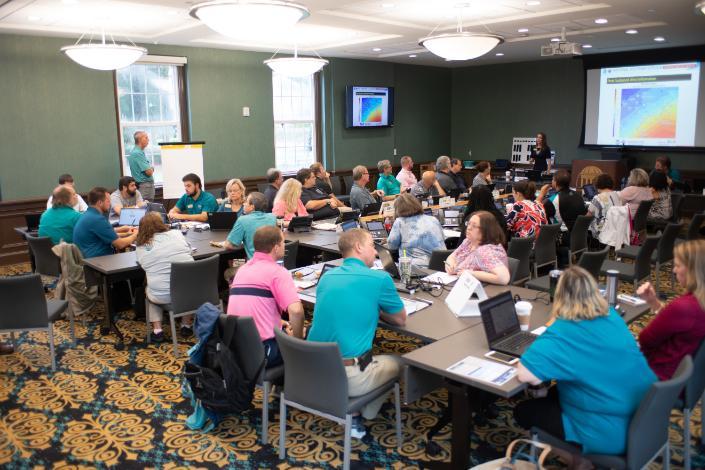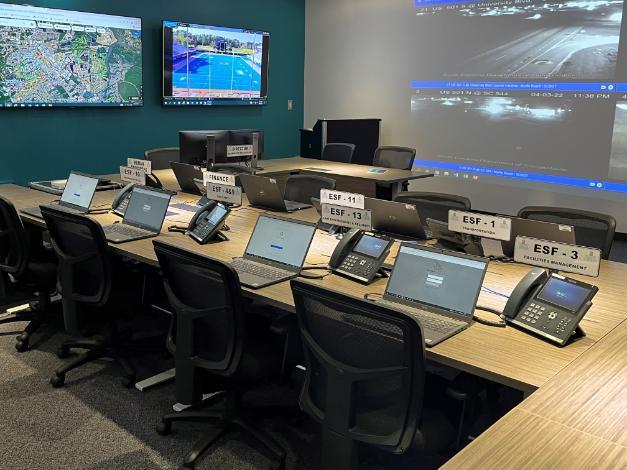Emergency Operations
Emergency operations are those actions undertaken when a large-scale or complex emergency or threat that may disrupt the overall operations of the University is imminent or a disaster has impacted the campus. The primary purpose of all emergency-related actions is to protect the students, faculty, staff and visitors, and to mitigate and recover from the impact of emergencies and disasters on life and University property. Emergency operations will be executed with the activation of the CCU Emergency Operations Framework. The CCU Emergency Management Director leads the emergency operations organization, which is comprised of the Emergency Management Executive Group, EOC Management, and the Emergency Operations Center (EOC) staff.
When the University is provided advance notice of a large-scale or complex hazard or threat, potential or actual, that may impact the campus, CCU will take precautionary measures to prepare and safeguard the University community. These precautionary measures may include a suspension of campus operations. The suspension of campus operations will be extended throughout emergency operations as long as there are emergency conditions on campus. Such actions may include any of the following:
- Modification of campus services
- Classes and administrative offices operating on an abbreviated schedule
- Cancellation of in-person classes
- Closure of administration and staff offices
- Closure of campus
The decision to suspend operations in whole or in part is made by the president, or designee, in close coordination with the Emergency Management Executive Group and the Emergency Management Director. The group also considers the virtual options to ensure continuity of operations and academic continuity during a suspension of operations. The Emergency Management Executive Group determines the overall response and recovery priorities and is responsible for ensuring the ongoing mission of the University during emergency operations. The group is made up of executive-level leaders within the University’s administration who supervise departments within the emergency operations organization. The group also provides strategic direction for operational planning and reviews and approves the EOCs operational plans.
The EOC Management function is performed by staff from the Office of Emergency Management. EOC Management oversees all EOC operations such as maintaining the EOC schedule, provide guidance to EOC staff, and ensure all key components of the EOC are operational. EOC Management also collects emergency/disaster-related data and coordinates with EOC staff to document key metrics and produce essential elements of information to support situational awareness.
The EOC Staff is a dedicated team of staff and faculty who are trained to fulfill one of the 21 positions in the CCU EOC. EOC staff have significant capabilities and authorities to establish strategies and resource requirements for response operations. EOC staff work within a cyclical planning process that provides a mechanism in which the emergency operations organization collaborates to enhance situational awareness, streamline decision-making processes, and provide strategic direction for response and recovery operations. EOC staff continuously and concurrently assess operations, adjusting strategies when necessary, and plan for future operations.
CCU's Emergency Operations Center
The CCU Emergency Operations Center (EOC) is a physical location where strategic direction and support to the response organization at the emergency or incident site is provided. The EOC will activate for complex or large-scale incidents requiring resource coordination over multiple operational periods and anytime an incident or emergency goes beyond the University’s capabilities and/or requires multiple agencies.
In order to better support emergency operations, the University has established two EOCs, one on main campus and one on east campus. The decision on which EOC is to be activated is situationally dependent. The CCU EOC has successfully activated for both emergency/disaster situations and planned events. Below are several key components of the CCU EOC:
- The CCU EOC utilizes the principles of the Department of Homeland Security’s (DHS) National Incident Management System (NIMS) and is organized by Emergency Support Functions (ESFs). The EOC may activate fully, with all EOC staff present, or may partially activate utilizing only those staff members required for a particular incident.
- EOC staff personnel are identified and trained in emergency operations. Departments have identified primary and back-up personnel to serve on the EOC staff. They undergo a robust initial training regimen and are identified as University essential personnel. Continued training and exercise are key in the staff professional development.
- The EOC has dedicated equipment that satisfies the needs of both the operations and the staff. The equipment is portable and can be relocated & set up in a variety of locations under many circumstances. The technology employed in the EOC is designed to compliment the EOC equipment and provides:
- Situational Awareness
- Communications
- Incident/event management
- Infrastructure management
Main Campus EOC 






